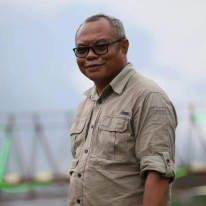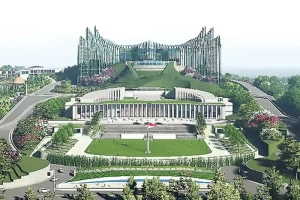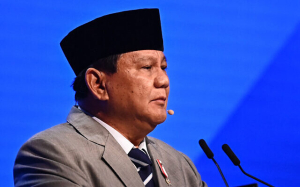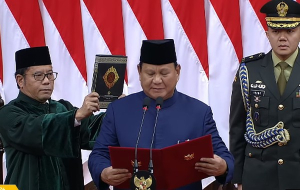Jokowi and KIM Plus-backed candidates dominate elections in major provinces
Results of the Quick Count vote-counting method on the 2024 Simultaneous Regional Elections by a number of survey institutions show the dominance of candidates in major provinces that have won the backing of former President Joko “Jokowi” Widodo and the Onward Indonesia Coalition Plus (KIM Plus).
Jokowi- and KIM Plus-backed candidates won in West Java, East Java, Central Java and North Sumatra − respectively the country’s top four provinces in terms of population. The four provinces were also the largest contributors for the victory of the Prabowo Subianto-Gibran Rakabuming Raka in the February 14, 2024 Presidential Election.
In West Java, the Dedi Mulyadi-Erwan Setiawan pair leads the provisional results of the 2024 West Java Pilkada, securing over 60 percent of the votes based on the quick counts from Litbang Kompas and Indikator Indonesia.
In East Java: the Khofifah Indar Parawansa-Emil Dardak pair outperforms two other competitors, Luluk Nur Hamidah-Lukmanul Hakim and Tri Rismaharini-Zahrul Azhar Asumta.
In Central Java: The Ahmad Luthfi-Taj Yasin pair is leading with about 59 percent of the votes, compared to rival pair Andika Perkasa-Hendrar Prihadi with 41 percent
In North Sumatra, Bobby Nasution, Jokowi's son-in-law who pairs with Surya, is leading by about 63 percent against rival pair Edy Rahmayadi-Hasan Basri Sagala, who secures the remaining 37 percent.
Only in Jakarta, however, that the Ridwan Kamil-Suswono pair that is supported by both Joko Widodo and the KIM Plus is trailing behind rival pair of Pramono Anung-Rano Karno, who is backed by the Indonesian Democratic Party of Struggle (PDI-P) and non-legislative Hanura Party.
This considerable success reflects the strength of Jokowi's support in various regions, especially through a combination of Jokowi's relatively still high popularity and the strategy of rallying support by the large coalition of KIM Plus.
A contrasting result in Jakarta, with the Pramono-Rano pair leading with around 50 percent of the votes in most surveys. However, uncertainty remains because the small margin could open up the opportunity for an election runoff as the Law on Election in Jakarta requires a minimum 51 percent for a candidate pair to win in one-round election.
Tight competition in Jakarta illustrates how voters’ preferences in the capital city are more dynamic and influenced by the candidate's figure and the developing political sentiment.
Determinant: Figure, not party
A researcher at the National Research and Innovation Agency (BRIN), Lili Romli, said that in regional elections, the candidates are more determining than party affiliation or ideology.
“Support from influential figures, such as Jokowi, has a big impact, especially when the candidate is able to utilize a solid mass base,” Lili Romli told Indonesia Business Post on Thursday, November 28, 2024.
However, there are also other variables that influence the results, such as the incumbent's performance and support by non-government but influential organizations such as the Nahdlatul Ulama (NU). Edy Rahmayadi's defeat in North Sumatra, for example, reflects public dissatisfaction with his governorship. Meanwhile, being a representation of NU was key to Ahmad Lutfi-Taj Yasin's victory in Central Java.
The 2024 Simultaneous Regional Elections show the dominance of candidates supported by Jokowi and KIM Plus in major and strategic regions, but also underline the political dynamics in Jakarta which are different from other regions.
Factors of candidate figures, performance, and consolidation strategies are keys to success in this regional political contest. The regional election also confirms that a solid mass base and the support of influential figures are still important elements in winning the hearts and supports of voters.
Already have an account? Sign In
-
Start reading
Freemium
-
Monthly Subscription
30% OFF$26.03
$37.19/MonthCancel anytime
This offer is open to all new subscribers!
Subscribe now -
Yearly Subscription
33% OFF$228.13
$340.5/YearCancel anytime
This offer is open to all new subscribers!
Subscribe now






